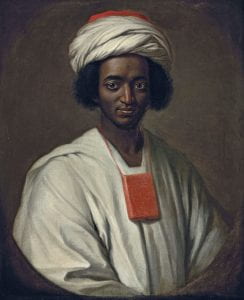by Aliyah Khan (University of Michigan, Ann Arbor)

Ayuba Suleiman Diallo, called Job ben Solomon (1701-1773), by William Hoare, 18th Century, National Portrait Gallery, London
Ayuba Suleiman Diallo (1701–1773), Fula Muslim of Senegal, was one of an unknown number of West African Muslims enslaved in the Americas. Diallo was enslaved in Maryland and was one of very few Africans who were able to return home to Africa: first to Gambia and then to Senegal. How could he make his way home when most others could not? Diallo distinguished himself in the same way that some other enslaved African Muslims did in the United States and in the Caribbean: as an upper-class Fula Muslim, he could read and write in Arabic and/or transliterated ajami, and he could communicate his identity and religion to sympathetic whites.
Like Omar ibn Said (Senegal) and Bilali Muhammad (Sierra Leone/Guinea, then Sapelo Island, Georgia), his fellow African Muslims enslaved in the United States, Diallo by many accounts remained a practicing Muslim even while engaging in various ways with Christianity in what might be called the Islamic practice of taqiya (prudence or fear), whereby a Muslim is permitted to hide his or her faith if under religious duress. Ibn Said, Muhammad, and Diallo were also scholars who wrote autobiographical texts and Islamic religious treatises from memory. Diallo’s early slave narrative accounts were published within other 18th century writings by Thomas Bluett and Francis Moore; Bilali Muhammad’s original Ben Ali Diary is at the University of Georgia library and Omar ibn Said’s papers are held by the Library of Congress.
As many as ten percent, or tens of thousands of enslaved Africans in the Americas, may have been Muslim. As difficult as it is to estimate the overall number of Africans who embarked upon slave ships and did or did not survive the Middle Passage, it is impossible to know how many enslaved Africans might have been Muslim. What we do know is that, though a continental religious minority, Muslims of many ethnicities and tribal affiliations lived in the West African Senegambian and Guinean slave-trading regions. Once in the Americas, by dint of their literacy and educations, some enslaved Muslim Africans were treated better on plantations and were given positions like driver and bookkeeper more often than non-literate and non-Muslim Africans.
In my book Far from Mecca: Globalizing the Muslim Caribbean (Rutgers University Press, 2020), I establish and trace a lineage of Black literary Islam in Caribbean and in the hemispheric Americas that begins with the writings of enslaved West African Muslims and flowers in the 20th century poetry of the Guyanese Abdur-Rahman Slade Hopkinson, who I call the Muslim Poet Laureate of the Caribbean. What a number of West African-Caribbean texts and Hopkinson’s work have in common, besides the authors’ Black Muslim identities that span centuries, is a strong Sufi Muslim strain and engagement with Sufi theological concepts. Sufism is the so-called “mystical” branch of Islam, of the whirling dervishes and the Persian poets Jalaluddin Rumi and Omar Khayyam. In the form of tariqa brotherhoods, Sufism held strong in West Africa from the 15th century onwards, even when falling out of favor elsewhere. Literary West African Islam reached a height in the fifteenth and sixteenth centuries with 150–180 predominantly Sunni Qur’anic schools in Timbuktu, international engagement with Sunni Egyptian scholars, and travel to the Arabian hajj. Sufism arrived in Timbuktu from the North African Maghreb region in the fifteenth century.
In Far from Mecca I discuss the Islamic writings of two West African men enslaved in Jamaica in the early 1800s, Muhammad Kabā Saghanughu of Ivory Coast and Abu Bakr al-Siddiq of Timbuktu. Kabā was likely a Mande, born into the Sūwarīan tradition of the Qādiriyyah Sufi brotherhood of Senegambia. Abū Bakr al-Siddīq was originally from Timbuktu, Mali, home of the famed aforementioned Sunni and Sufi Islamic schools. Kabā, Abu Bakr, and Hopkinson’s literary works are linked across a transnational, migratory century-and-a-half by a concern with Sufi Muslim ideas of the “hidden” (batin) and other political-religious principles of West African Islam. The work of Hopkinson, a 20th-century Afro-Guyanese poet and convert (or revert) to Islam, is influenced by the poetry of Sufi greats like Rumi, Khayyam, and Ferid-ud-Deen Attar and explicitly engages with the contradictions of faith and the binary struggles of Sufism: between materiality and spirituality, ego and soul, divine and profane, and ecstasy and suffering.
In Guyana today, the casual and somewhat derogatory word for a Muslim of any race—Black or a descendant of indentured laborers from India—is fullaman, derived from the tribal names of Fula/Fulani enslaved African Muslims in the Caribbean. In Trinidad, a common word for any Muslim is, similarly, Mandinga, from the Mandinka. While West African Islam did not survive unbroken in the Caribbean into the present day, enslaved West African Muslims still lent their tribal names to every Muslim in these Caribbean countries. I seek to recover the history and literature of African Muslims in the Americas: words spoken in their own tongues and written by their own hands.
